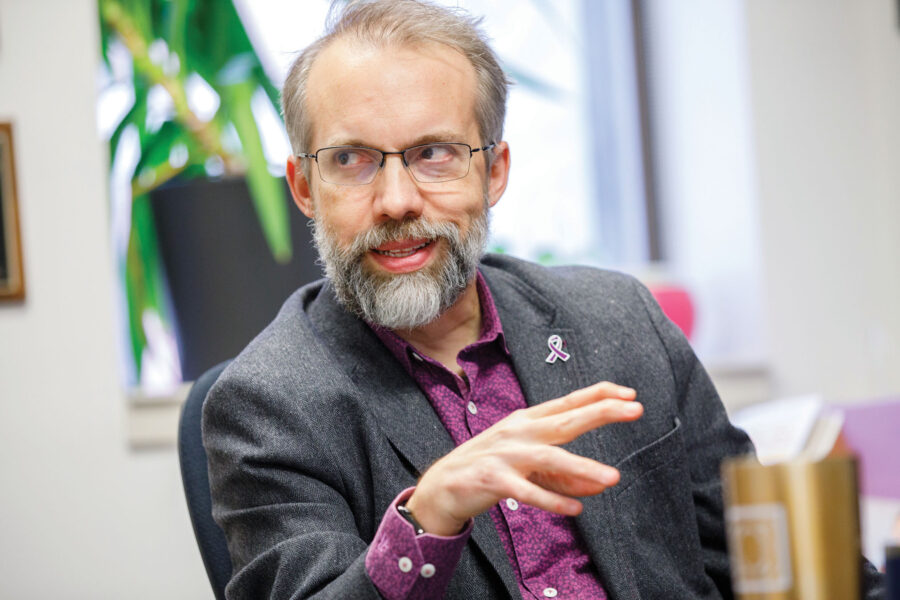Kaleb Michaud, PhD, professor of rheumatology, had given a lot of talks, but never one in which he cried or cursed.
Never one in which he put up cute pictures of himself as a kid and discussed the worst days of that kid’s life.
Never one in which he would go beyond the science of his specialty, rheumatic diseases, and disclose things even people who’ve known him well for years didn’t know. That he is living with juvenile idiopathic arthritis (JIA). That he was diagnosed in 1977, at age 3, with juvenile rheumatoid arthritis (JRA). That JIA, JRA and/or RA have been affecting him his entire life.
Never one in which he told a roomful of experts what it’s really like to live with these conditions that they study and treat.
It was a momentous decision to do so. Like stepping off a ledge.
But it was time.
Dr. Michaud had achieved the rank of full professor, tenure. His childhood doctor, who eventually became his research mentor, had just died, and he was asked to give the American College of Rheumatology’s Distinguished Lecture. That isn’t a regular lecture. It’s a speech in which the speaker is encouraged to talk about anything they want.
If you want to believe in signs, they were flashing like the Vegas strip.
So, he stepped to the podium at the 2023 ACR Convergence, took a deep breath and told his truth, a truth he’d kept quiet — that in addition to being one of the world’s most respected rheumatology researchers, he’s also a patient. He’s lived these very conditions.
He kept quiet because he recognized — when he arrived at his first conference decades ago — that his peers would look at him as a patient, not a scientist, a condition, not a colleague. Instead of hearing his insights, they’d silently be diagnosing the way he held his hands.
Now, he was ready to tell the assembled audience the truth. The whole truth.
In front of national experts, Dr. Michaud told his story chronologically. He started with that cute photo. The little boy in it looked happy. It was his birthday party. There was ice cream.
It was in a hospital.
Dr. Michaud was 3 when he first complained of leg and foot pain. “I had a hard time walking. I remember the pain coming out of that knee. I remember the attention I got.”
They gave him so much aspirin for the pain, he hallucinated. “It was the dark ages,” Dr. Michaud said.
His parents were beside themselves. They took him to doctors. Traveled to Dallas to see the closest (only?) pediatric rheumatologist they could find.
He was given gold compound injections. Oh, how it hurt.
“I thought I was increasing my value,” the adult Dr. Michaud joked.
Through it all, pain so bad it remains vivid, to this day.
But beyond the physical, there also was the pain of the unknown. Why was this happening? Was there anything that could be done? Would it ever get better?
And the growing realization that the adults in his life, including the doctors, didn’t have answers.
He wondered if he’d done something bad, and God was punishing him.
It also was clear that these adults believed he’d eventually spend his life in a wheelchair, a life that would not last much beyond age 26. That number stayed with him. It loomed over him.
When he was 10, he saved money and bought a dog. That helped so much, he said. “Knowing someone else depends on you has a huge impact,” he said.
Young Kaleb was whip-smart, curious, interested in everything. But school also meant stairs.
“I identified greatly with the Tin Man from the Wizard of Oz,” Dr. Michaud said.
Eventually, he would identify with Professor X, from the superhero X-Men comic books. Professor X was in a wheelchair, but he was a genius scientist and leader. The great Patrick Stewart portrayed him in the movies.
Now, he had a role model and a goal.
Dr. Michaud knew he could live a fulfilling and impactful life as Professor X.
Still, that was a long way away.
Everyday life meant everyday pain. He learned a kid’s form of self-hypnosis to deal with it. He would think of a favorite cartoon to distract himself. As he imagined it, it would take him away.
His dog. The cartoon. Eventually board games.
As his earliest medical note said, he was best able to deal with his pain when distracted by play.
By 10, the medical record also officially said he had long-term arthritis.
“Psychosocially, he is doing very well,” it said.
Except he wasn’t.
“When I was 12, I was not fun. Why? Because I learned to complain,” Dr. Michaud said. Friends grew tired of it. So did he. He told his mom he thought he might be manic depressive. “Oh, Kaleb,” she said. He wasn’t manic depressive. He was normal. Who wouldn’t feel depressed, she pointed out, with what he was facing?
“I did try to commit suicide,” he said. A shrug. “Obviously, I failed.
“I did try to run away. I don’t say it to get sympathy but … you don’t know what to do. You are looking for an escape.”
Junior high. “Puberty sucks,” Dr. Michaud said.
Moreso when it includes surgeries; joints often awkwardly fused, then later painfully unfused. The interventions — and pain — continued through the years.
Decades later, he inhaled deeply, remembering. “You think about those moments,” he said. “Because they stick with you.”
And, there were so many. He remembers his dad, so big and strong, having to step forward to help a doctor yank metal out of his fused toes.
As he described the moment, all these years later, Dr. Michaud couldn’t hold back a sob. A dad now himself, it hit him how crushing that must have been for his father, too. Pulling as his son screamed.
They kept testing new medicines. Each one came with hope … and side effects.
Increasingly, it fell upon him, the patient, to find the line, the dosage that helped keep him functional without wrecking his gut (it still did).
College. He was elected student president in a landslide. He was a supernova.
“I had lived my life thinking I wasn’t going to live past 26,” he said. “I thought I was being punished … I was trying to live a life to make up for that.”
Another new medicine. He should try it, they said, “but you could die.”
It seemed to work. (With side effects.)
On to grad school at Stanford, to become Professor X.
He impressed people on the West Coast, he said, and could have gotten in on the ground floor at Google. He’d have been employee No. 27, surely a billionaire today. He still thinks about that when writing grants.
The startup offered him a job three times, he said. But no, he kept on the academic track. He needed to become Professor X.
He couldn’t risk not having health insurance.
But at Stanford the brick walls he hit began to knock him over. More surgeries. One bad fit for a mentor, then another. Brilliant men who could win the Nobel Prize (one of them did) but unable to grasp why Kaleb couldn’t keep up.
At last, a difficult conversation: “A leave of absence.”
He returned home and checked in on Fred Wolfe, MD, the man who’d first diagnosed him with juvenile rheumatoid arthritis. Dr. Wolfe wasn’t just any physician; he’d founded the Wichita Arthritis Center, the Arthritis Research Center Foundation and the National Databank for Rheumatic Diseases. He was a pioneer in helping define fibromyalgia. His papers have been cited more than 125,000 times.
Dr. Michaud had helped Dr. Wolfe before, as a teenager, pecking on a Gateway 2000. Would he be interested in working for him again?
He was. “I got serious about what I was going to do,” Dr. Michaud said. “I was going to make a difference. I was going to help people.”
He tagged along to the first rheumatology scientific conference, then another. He immersed himself in the research. He became Dr. Wolfe’s right-hand man. They started calling him Dr. Wolfe Jr. Then they started calling him “Dr.” Michaud.
He realized he’d found his life’s calling.
“I learned I wanted to get those extra letters after my name,” he said.
All the adults, including the doctors, who didn’t have answers? He would help find them. All of the kids like him who were living in pain? He would give them tools.
“When I first went into rheumatology research, I was so angry (there hadn’t been any answers) I wanted to make up for it. I’m not angry anymore.”
The years have helped him see that everyone did the best they could.
Through his research, he is looking for those tools. With this talk, he is telling the experts things they couldn’t possibly know.
He advanced in his research and in his career. He came to UNMC in 2007.
In 2016, two months before his firstborn arrived, he asked for his wrist to be fused, “so I could hold her.
“That seemed like something that would never happen.”
Two decades beyond 26, Dr. Michaud, winner of UNMC Research Leadership and Distinguished Scientist honors, is married with children and a good career.
He’s not in a wheelchair.

He takes 10 pills a day (16 on Tuesdays), keeps his caffeine intake just right, gives himself biological injections, makes sure to pet his cat (it’s good for both of them). Oh, and board games, because he still feels better when he is distracted by play.
He’s had to give up his favorite drink (Coke Zero), keep up on physical therapy. A change in weather or even trying a new food can send him reeling. The pharmacy called saying one of his regular drugs won’t be covered by the insurance company and he and his doctors need to find a new one.
He had an ER scare two weeks before his big speech, another flashing sign it was time to say what he had to say.
“It made it that much more emotional, like just how real this disease is,” he said. “You don’t know when something could completely disable you or take you away.”
And how was it received? How did the clinicians and researchers react to an undercover patient in their midst?
“There was resounding positive response with people coming up to me a day later, grabbing my hands and, in tears, thanking me,” Dr. Michaud said.
“It was much more than I expected or anticipated.”
Turns out, it needed to be heard, just as it needed to be said.
Today, life continues. A life far beyond what he’d once dared imagine.
A life, he said, he still expects to end “sooner than normal.”
That may sound harsh to those of us who let our guard down enough to savor this story’s happy ending. But Dr. Michaud is the one who has walked this journey, on fused bones.
JIA, JRA, RA, whatever you call it.
“It’s still there every day,” he said.
